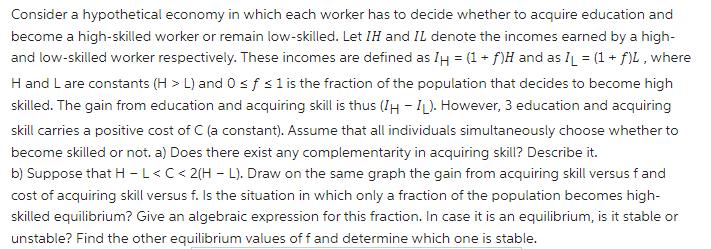Answered step by step
Verified Expert Solution
Question
1 Approved Answer
Consider a hypothetical economy in which each worker has to decide whether to acquire education and become a high-skilled worker or remain low-skilled. Let

Consider a hypothetical economy in which each worker has to decide whether to acquire education and become a high-skilled worker or remain low-skilled. Let IH and IL denote the incomes earned by a high- and low-skilled worker respectively. These incomes are defined as IH = (1 + f)H and as IL = (1 + f)L , where H and Lare constants (H > L) and 0s f sl is the fraction of the population that decides to become high skilled. The gain from education and acquiring skill is thus (IH - IL). However, 3 education and acquiring skill carries a positive cost of C (a constant). Assume that all individuals simultaneously choose whether to become skilled or not. a) Does there exist any complementarity in acquiring skill? Describe it. b) Suppose that H -L
Step by Step Solution
★★★★★
3.53 Rating (153 Votes )
There are 3 Steps involved in it
Step: 1
a The formulation conveys the following concept a persons productivity is positively correlated with both his own and his coworkers skills But theres more observe that IH IL 1 H L implying that the ga...
Get Instant Access to Expert-Tailored Solutions
See step-by-step solutions with expert insights and AI powered tools for academic success
Step: 2

Step: 3

Ace Your Homework with AI
Get the answers you need in no time with our AI-driven, step-by-step assistance
Get Started


